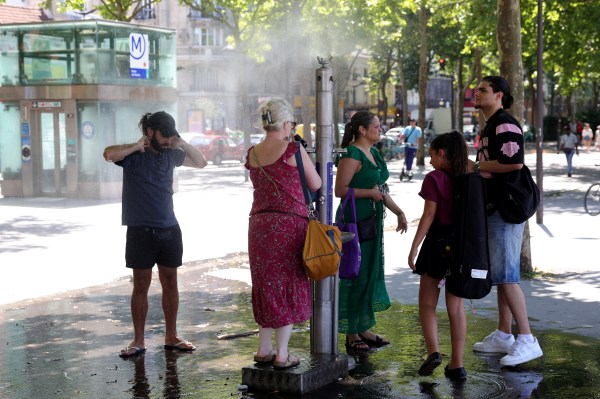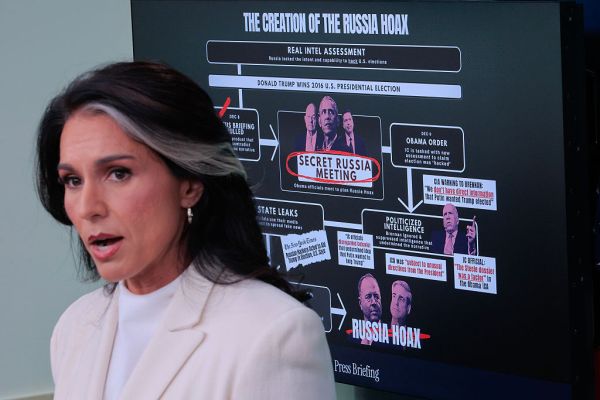In a now-viral comedy sketch from April, two actors portraying President Joe Biden and Vice President Kamala Harris stand at a lectern flanked by American flags to deliver a speech on the Ukraine War.
“Today, we’re going to talk about the crisis in Spain. No, we’re going to talk about the crisis in Africa. Yeah—Russia,” the Biden impersonator says in accented English, while a man dressed as the vice president whispers the correct lines in his ear. “And I want to talk about the President of Russia,” he trails off, appearing to forget Vladimir Putin’s name before referring to the Harris impersonator as his “first lady.”
The not-so-subtle dig at Biden’s mental acuity quickly picked up international attention, but it wasn’t the work of Russia, China, Iran, or any of the United States’ other adversaries. Rather, the skit appeared on popular Saudi Arabian television show Studio 22 during a low point in the longtime U.S.-Saudi partnership this past spring. Around the time of its broadcast, Crown Prince Mohammed bin Salman (MBS)—Saudi Arabia’s de facto head of state—reportedly refused to take Biden’s calls as the West scrambled to find alternatives to Russian oil.
The rumored snub came as no surprise to many. On the campaign trail, Biden famously denounced the kingdom as a “pariah” with “very little redeeming social value” because of its poor human rights record. Within months of entering the White House, the president released an unpublished report directly implicating MBS in the murder of Saudi journalist and dissident Jamal Khashoggi. Several other of the president’s early decisions, such as the administration’s revocation of the Yemen Houthis’ terrorist designations, further inflamed tensions between Washington and Riyadh.
But as the war in Ukraine causes energy prices to skyrocket worldwide, the Biden administration is now realizing that it can no longer afford to isolate one of the world’s foremost oil exporters. As part of a broader effort to “reset” U.S. relations with its regional partner, the president will travel to Jeddah, Saudi Arabia, in July for a series of high-profile bilateral meetings and a Gulf Cooperation Council summit that will also include Egypt, Iraq, and Jordan.
Saudi officials, for their part, are eager to see the visit re-center the two countries’ mutual interests. But after more than a year of distancing itself from Saudi Arabia, the Biden administration might still have its work cut out for it. “We’ve already hit rock bottom,” one Riyadh-based analyst told The Dispatch. “It can only get better from there.”
The Saudis consider the president’s visit, during which he is expected to meet with the crown prince for the first time, a diplomatic win in itself. “This is a president who made very negative statements not only about the person—the crown prince, directly or indirectly—but also about the country itself,” Yasmine Farouk, of the Carnegie Endowment for International Peace, told The Dispatch. “The fact that Biden is the one going all the way to Saudi Arabia to meet with him is already a political victory and is being presented as such in Saudi media.”
Early this month, the Organization of the Petroleum Exporting Countries and affiliate countries known as OPEC+—an international group of oil producers effectively led by Saudi Arabia—agreed to increase their oil production by 50 percent for two months. Keeping a steady supply of reasonably priced oil flowing to the West will almost certainly be a key priority of Biden and his entourage.
In exchange for Saudi Arabia providing the West with a stable energy supply and ensuring oil market stability, the U.S. has historically aided in the kingdom’s territorial defense and security—priorities seemingly shelved when the administration delisted the Houthis and resumed negotiations with their Iranian backers last year.
During an uptick in missile and drone attacks from the Houthis last year, the U.S. removed several anti-missile defense systems, including Patriot batteries, from Saudi Arabia. Though at least some Patriots were transferred to the country in March, the initial relocation was widely regarded in Riyadh as the administration’s abandonment of Saudi Arabia’s national security to score domestic political points.
“Imagine a scenario where Hamas is firing missiles on Israel, and America decides, ‘you can’t have the Iron Dome.’ Or, ‘we’re going to de-list Hamas from the terrorist list, because we don’t like Trump and Trump is the one that put them on the terrorist list,’” the Riyadh-based analyst told The Dispatch. “You withdraw Patriot missiles, you delist the Houthis, and then you come and ask us for a favor?”
And the U.S. withdrawal from Afghanistan signaled to Saudi Arabia an American retreat from Central Asia and the Middle East more broadly, particularly as Biden’s national security team honed in on the Indo-Pacific.
“Across the region, there is a deeply rooted conviction that America has betrayed its morals and that it abandons its allies and friends,” Faisal J. Abbas, editor-in-chief of Arab News, told The Dispatch. “The recent scenes from Kabul airport are the latest example.”
The kingdom is likely to request greater defensive cooperation from U.S. officials during the visit in realms like intelligence sharing and arms transfers, according to experts. But some have even predicted that the Saudis might request security guarantees—something reportedly being negotiated by the U.S. and another Gulf ally, the United Arab Emirates (UAE). While a mutual defense clause on par with NATO’s Article 5 with Saudi Arabia remains highly unlikely, U.S. officials have sought to signal their renewed commitment to the country’s security in recent weeks.
“The president … looks forward to outlining an affirmative agenda for America’s engagement in this vital region, making clear that the United States is fully committed to supporting the territorial defense of our partners against threats from Iran or elsewhere,” a U.S. official said during a call with reporters last week. “Saudi Arabia has faced hundreds of missiles and UAVs over the last 18 months, many of them targeting areas where Americans live and work. And so we have been engaged very deeply and very constructively with the Saudis to help defeat those threats.”
As the administration’s indirect negotiations with Iran to curb its nuclear program seem to deteriorate in Vienna, Austria, these conversations have become even more relevant. The U.S. and its Gulf partners will need to cooperate closely to counter their common adversary, officials say, particularly if it manages to weaponize. But former President Barack Obama’s 2015 controversial nuclear deal with Iran—and Biden’s efforts to restore it—has long been a major flashpoint between the Democratic administrations and their Middle Eastern allies.
“It’s unlikely that Iran is going to attack America any time soon. We are the people at the receiving end, so we have more at stake. The problem with Iran goes beyond its nuclear ambition,” Abbas argued, pointing to Iran’s sponsorship of regional terrorism and attributing the original agreement to shortsighted political maneuvering by the Obama administration.
“It strikes me that there is a regional consensus around Iran that the United States has been on the outside of and now it needs to do something,” Steven A. Cook, senior fellow for Middle East and Africa studies at the Council on Foreign Relations, told The Dispatch. “Any kind of American leadership of a regional coalition to contain the Iranians is going to have to involve the Saudis.”
Presenting a united front will also require close cooperation with Israel, where Biden is scheduled to meet with high-ranking officials before his trip to Jeddah. “The visit will … focus on Israel’s increasing integration into the region, both through the Abraham Accords with UAE, Morocco, and Bahrain; through deepening ties between Israel, Jordan and Egypt; and also an entirely new groupings of partners, including Israel, India, UAE, and the United States,” the senior administration official said last week.
The official stopped short of speaking on efforts to normalize ties between Saudi Arabia and Israel, though the two countries have long collaborated behind the scenes. According to Axios, the Biden administration hopes to bring about a deal that would transfer control of two strategically located islands in the Red Sea to Saudi Arabia. In exchange, the Jerusalem Post reported this month, Saudi Arabia is expected to open its airspace to Israeli airlines. Such an agreement would lend Bident the political points necessary to justify the controversial trip to an American audience.
“The issue of the relationship between Israel and the Gulf partners—and especially relations between Saudi Arabia and Israel—is one of the rare policy continuities between the Trump administration and Biden administration,” Farouk said, but added: “A breakthrough in this bilateral relationship is not as easy as presented by Israeli politicians or even politicians and some experts in the United States.”
Collaboration with Israel is one area among many where summing up the U.S.-Saudi relationship as “oil for guns” is probably an oversimplification. Anticipating the need to diversify their economy as the West began its shift away from hydrocarbons, the Saudis have made significant investments into developing tourism, nuclear energy, and even space exploration sectors. The U.S. has a vested interest—economic and strategic—in getting its foot in the door of these budding industries ahead of Russia and China.
“Our objectives are closely aligned with the U.S.’s objectives, including working together on climate change, regional security, food and energy security, and countering Iran’s destabilizing activities,” a Saudi official in the Saudi embassy in D.C. told The Dispatch.
Asked if he thought next month’s summit would mark a turning point in the U.S.-Saudi partnership, Abbas—the editor-in-chief of Arab News—said he hoped for a “return to the norm”: “The norm is that this relation is strong, mutually beneficial, does global and regional good and that it is far more important than just talking about oil.”







Please note that we at The Dispatch hold ourselves, our work, and our commenters to a higher standard than other places on the internet. We welcome comments that foster genuine debate or discussion—including comments critical of us or our work—but responses that include ad hominem attacks on fellow Dispatch members or are intended to stoke fear and anger may be moderated.
With your membership, you only have the ability to comment on The Morning Dispatch articles. Consider upgrading to join the conversation everywhere.